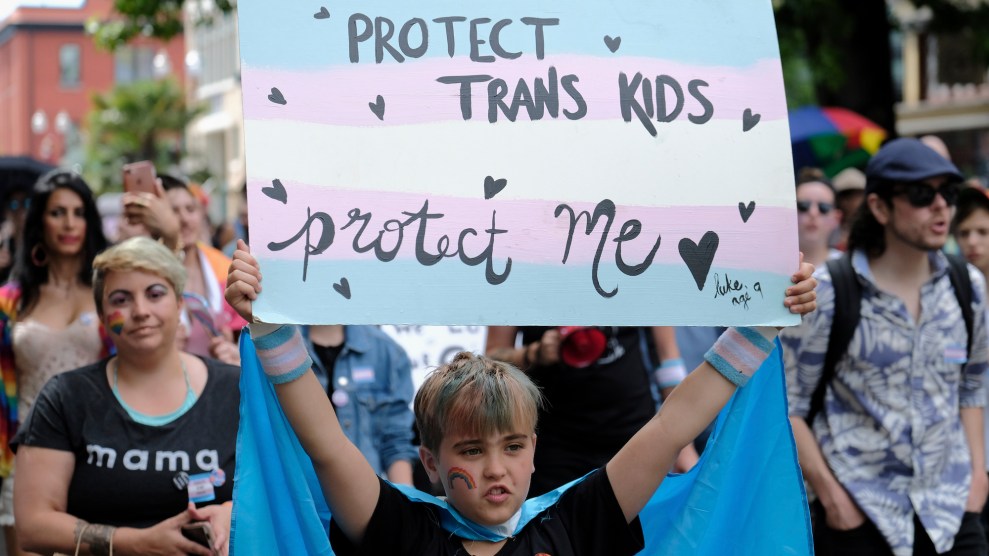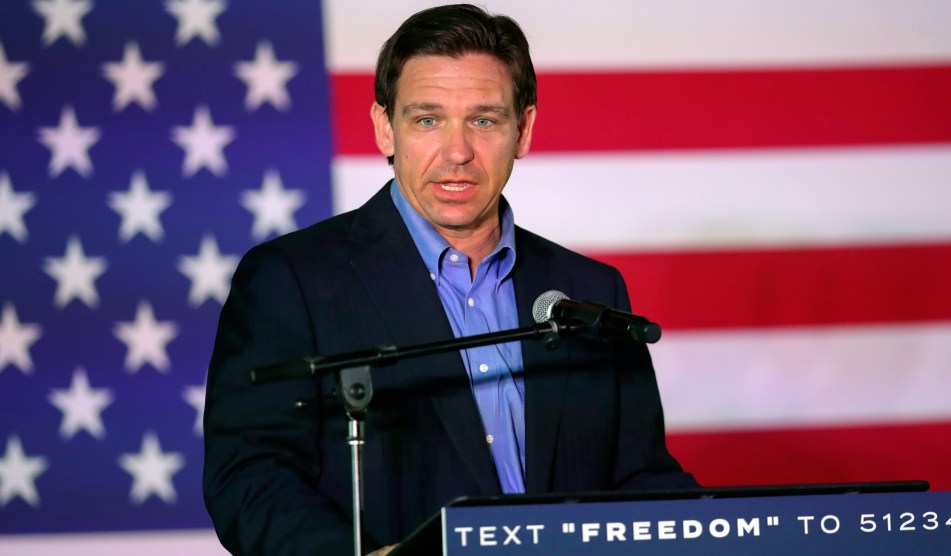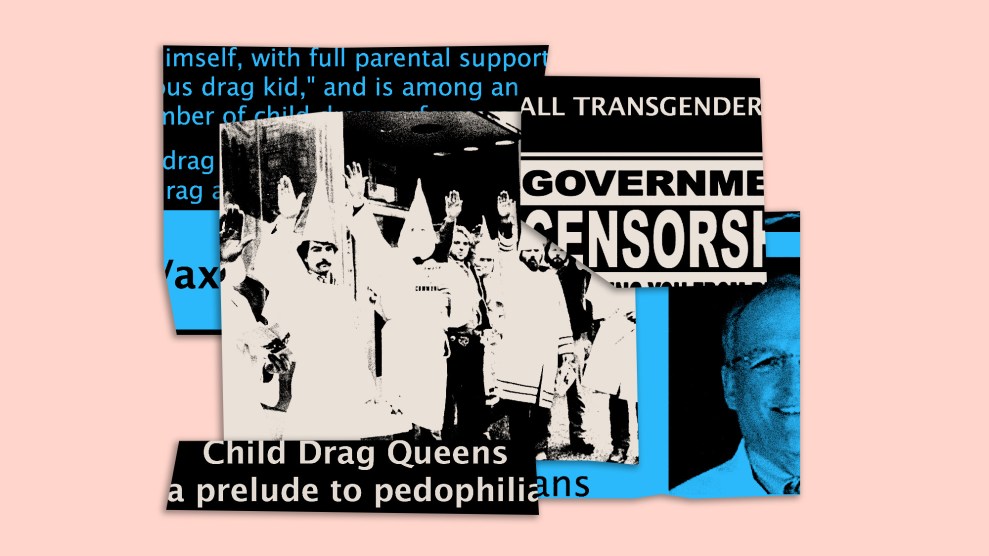
Alex Milan Tracy/Sipa USA/AP
Over the last two years, Republican state politicians have done their best to wipe out access to gender-affirming medical care for trans adolescents. In a flurry of lawmaking—coordinated by conservative Christian legal groups and think tanks, and backed by fringe doctors and activists who deny that anyone is truly transgender—a whopping 20 states have passed laws forbidding medical professionals from caring for trans adolescents with treatments supported by all major US medical associations.
Three more states may still pass similar bans this year: In North Carolina, and Louisiana, Republican-controlled legislatures are preparing to call special sessions to override their Democratic governors’ vetoes of several anti-LGBTQ bills, including trans healthcare restrictions. And Ohio still has a ban on the table.
Yet even as more states consider banning affirming medical care for trans youth, federal courts are blocking or overturning these restrictive laws in a cascade of wins for transgender rights. In Arkansas, on June 20, a federal judge struck down a law banning gender-affirming care for youth, concluding after a trial that “the evidence showed that the prohibited medical care improves the mental health and well-being of patients” and that despite its claims to the contrary, the state hadn’t been protecting children when it passed the law. Meanwhile, judges in Florida, Indiana, Kentucky, and Tennessee all granted temporary injunctions last month that will keep puberty blockers and hormone therapy accessible to trans adolescents while legal challenges to their state bans play out in court. (Update: Tennessee’s injunction was overturned on July 8 and the ban was allowed to go into effect.)
The decisions, all issued during Pride month, follow a similar ruling in Alabama in May 2022 that temporarily blocked a law banning gender-affirming medication for trans people under the age of 19. All in all, in almost every court case so far in which a decision has been issued on gender-affirming care bans for youth, judges have sided with the trans adolescents and their families suing for access to treatment.
The rulings are a victory—though temporary, in some cases—for the parents who have sued their states to protect their children’s healthcare. The plaintiffs include the mom of a 9-year-old in Florida who had told her parents she was a girl even before she started kindergarten. According to court filings, she had stopped expressing the desire to self-harm after socially transitioning, and was waiting to start puberty blockers before the new law was passed. In Kentucky, a dad sued the state to protect his 14-year-old transgender son’s access menstruation suppressants and testosterone patches—medication which had helped reduce his gender dysphoria and suicidality. And in Arkansas, the parents of a 10-year-old transgender girl joined a lawsuit knowing that if the ban there took effect, they would have to move to make sure their daughter could get appropriate medical care when she enters puberty.
The rulings—which come from judges appointed by Trump as well as Obama and Clinton—show “that there’s light at the end of the tunnel” for the transgender youth and their families affected by bans, says Omar Gonzalez-Pagan, counsel and health care strategist for Lambda Legal, a major LGBTQ civil rights organization representing some of the plaintiffs. “Many of these decisions are incredibly detailed, frankly really comprehensive decisions that dress down every single one of these arguments and explains the science, the medicine, and the lived experiences of the transgender adolescents and their families that we represent.”
The treatments at issue include puberty blockers that delay the development of secondary sex characteristics in pubescent kids; cross-sex hormone therapy for teens and adults; and, almost exclusively for adults, surgery. Years of research and clinical experience show that gender-affirming treatments are associated with better mental health outcomes over both short and longer-term periods. While most of the recent laws forbid this care for patients up the age of 18 or 19, Florida’s law also drastically restricts it for adults by banning RNs and advance practice nurses from prescribing hormone therapy, and likewise outlawing telehealth hormone therapy prescriptions by doctors.
The new laws seek to prohibit the use of gender-affirming medical care to treat gender dysphoria, the clinical term for the significant distress some trans people experience when their bodies don’t align with their internal sense of gender. Yet the same treatments are allowed for cisgender people, such as puberty blockers for children who begin puberty too early.
National groups supporting LGBTQ rights have filed legal challenges against the bans in at least 10 states so far, arguing that they illegally discriminate against trans adolescents on the basis of sex and transgender status, and get in the way of parents’ right to direct medical care for their children. “The main thrust of the arguments in these cases is that our Constitution prohibits people from being treated differently by the government because of who they are,” Gonzalez-Pagan explains. “Separately, our Constitution protects the right of parents to raise their children, and to provide them with the medical care that they need. And these laws interfere with that.”
So far, federal judges have seemed to agree. “If Tennessee wishes to regulate access to certain medical procedures, it must do so in a manner that does not infringe on the rights conferred by the United States Constitution,” US District Court Judge Eli Richardson, a Trump appointee, wrote in his opinion blocking the ban in Tennessee. “Tennessee has likely failed to do just this.”
The injunctions indicate that the courts aren’t buying the states’ claims that gender-affirming medical care is experimental and that minors would grow out of their gender dysphoria if they didn’t receive treatment. (In fact, detransitioning is rare: About 1 percent of people who receive gender-affirming surgery later express regret about it.) US District Court Judge James Moody Jr., who granted the permanent injunction overturning the law in Arkansas, wrote that the state had zero evidence to support its claim that major medical organizations supported gender-affirming care because they had succumbed to progressive ideology. “To accept this claim would require the Court to both credit…the notion that every major medical association in the United States is driven by ideology rather than science and patient well-being,” Moody wrote. “There is no basis and no evidence supporting such a conspiratorial assessment of all the major medical associations.” The state of Arkansas is appealing his decision.
The rulings in Arkansas and Florida also discredited the “expert” testimony of doctors who frequently testify in public proceedings against gender-affirming care—including Paul Hruz, a pediatric endocrinologist who has called transgender identity a “false belief” and “delusion,” and Patrick Lappert, a plastic surgeon who has never performed gender-affirming surgery. Both doctors testified in support of the bans in the Arkansas and Florida lawsuits. Yet, as Moody wrote in the Arkansas ruling, the doctors “were testifying more from a religious doctrinal standpoint rather than that required of experts.”
“Gender identity is real,” US District Court Judge Robert Hinkle wrote in two orders in June, one of which temporarily blocking enforcement of the ban in Florida. (The other, in a closely related trial, overturned a Florida policy restricting Medicaid reimbursement for gender-affirming care, which affected people of all ages.) “Any proponent of the challenged rule and statute should put up or shut up: do you acknowledge that there are individuals with actual gender identities opposite their natal sex, or do you not? Dog whistles ought not be tolerated.”
The series of temporary and permanent injunctions issued in June is just the start of the court battles over bans on gender-affirming care for minors. Only about half of the 20 state laws have been challenged so far. More lawsuits are forthcoming in Missouri and Texas, according to Gonzalez-Pagan. And there are other barriers, such as Medicaid and insurance rules, that can keep trans teens and adults from accessing the care they need—though challenges to such restrictions have also proved a winning issue for LGBTQ rights advocates.
“Knock on wood, we will continue in this wave of decisions,” Gonzalez-Pagan says. Yet he’s hesitant to declare a sweeping victory. “Even as we prevail, these bans are causing incredible harm right now,” he says. “They create an atmosphere of fear. They have driven families away from their homes in order to ensure that they have access to the care that they need. And that’s for the families who have the resources to do that.”
Still, there’s one more piece of good news: In December 2021, a federal appeals court issued a first-of-its-kind decision finding that the Americans with Disabilities Act protects people with gender dysphoria from discrimination. Last Friday, the Supreme Court declined to take up the case—meaning the lower court’s groundbreaking decision stands, granting ADA protections to people with gender dysphoria in Maryland, North Carolina, South Carolina, Virginia, and West Virginia. The case had been brought by Kesha Williams, a formerly incarcerated transgender woman in Virginia who argued that the Fairfax County Sheriff Stacey Kincaid had violated the ADA by housing her with men and denying her hormone treatments. “Being transgender is not a disability,” US Circuit Judge Diana Gribbon Motz wrote in the Fourth Circuit panel’s ruling. Yet “a transgender person’s medical needs are just as deserving of treatment and protection as anyone else’s.”


















